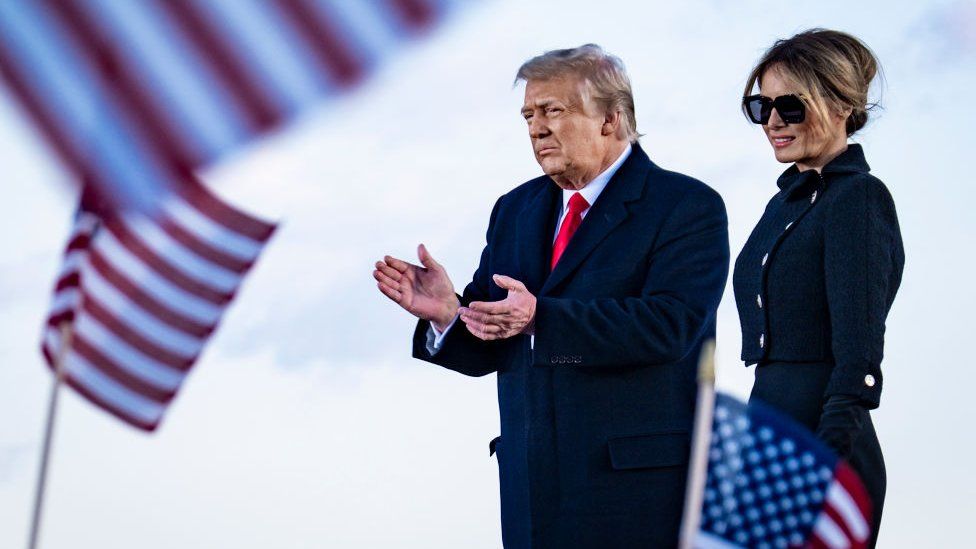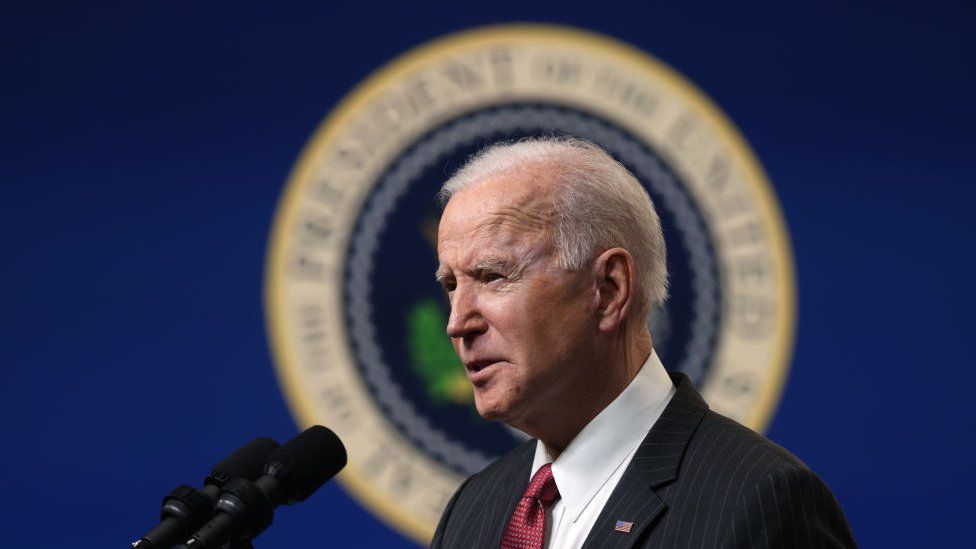
Only five days after it began, Donald Trump's Senate impeachment trial has concluded. As was widely predicted, the final verdict was that the former president was not guilty of inciting an insurrection at the US Capitol last month.
There have now been four presidential impeachment trials in US history, and this one was by far the shortest.
What it lacked in duration, however, it will make up in consequence. A precedent - a former president standing trial - was set. Reputations were burnished and tarnished. And a tumultuous stage was set for political battles to come.
Here's a look at some of the key players, and how they emerged from this moment in US history.
Donald Trump
New trial, same outcome.
Trump once again avoided conviction by the US Senate because his fellow Republicans, by and large, stuck by his side. The final tally was 57-43, which left the prosecution 10 short of the two-thirds majority required.
That, at its most basic level, is a win for the former president. He is still eligible to run for president again in 2024, if he so chooses. His base, by all indications, is still largely intact. Both in the House of Representatives and in the Senate, most Republican officeholders opposed the impeachment proceedings - and those who broke ranks are already facing ferocious criticism and, in some cases, formal reprimands from their Republican constituents.
In a press statement, the former president celebrated his acquittal, condemned Democrats and said that his political movement was just beginning.
Trump - and his movement - did not emerge from this impeachment trial unscathed, however. One of the most memorable portions of the prosecution case by House managers were the new videos of Trump's supporters, wearing Make America Great Again hats and waving Trump flags, ransacking the Capitol.
Those images will forever be associated with the Trump brand. Every rally he holds from here on will evoke memories of that riot. It may not cost him among the Republican rank and file, but independent voters - and moderates - are unlikely to forget.
Senate Republicans
A year ago, only one Republican senator - Mitt Romney of Utah - voted to convict Trump. This time, he was joined by six others.
It's no coincidence, however, that of those who broke ranks, three of them - Susan Collins, Ben Sasse and Bill Cassidy - were just re-elected and don't have to face voters for six years. Two - Pat Toomey of Pennsylvania and Richard Burr of North Carolina - are retiring.
That highlights the challenge facing many of the Republican senators in the chamber. A vote to convict would have attracted the ire of primary voters, many of whom would view the turn against Trump as a betrayal. For those in safe Republican states, a challenge from a fellow conservative is a much more pressing concern than whichever Democrat faces off against them in November.
Republican senators up for re-election next year in swing states - in places like Florida, Wisconsin and Iowa - may have to worry about their vote to acquit being used against them by their Democratic opponents in a general election. One can already envision the attack adverts, accompanied by video of the violence on Capitol Hill.
A lot could depend on what Trump does next. Does he launch himself fully into US politics again, reminding his supporters - and his critics - of these impeachment battles as the next election day approaches? Or does he stick to seclusion of his private clubs and golf course?
I think we all know which is more likely.
Mitch McConnell
If every Senate Republican had their own political calculation to make before casting their vote - weighing whether to risk the ire of their party or the judgement of general election voters - one particular senator's drama was on particularly stark display.
Mitch McConnell of Kentucky, leader of his party in the Senate, had been outspoken for weeks in his criticism of Donald Trump's conduct on 6 January. For a while, his final vote in the trial was in doubt. On Saturday morning, however, he informed his fellow senators he would support acquittal.
After the Senate rendered its final verdict, he explained why. He condemned Trump's behaviour and said he engaged in a "disgraceful dereliction of duty."
"There's no question that president Trump is practically and morally responsible for provoking the events of the day," McConnell said
His not guilty vote, he said, was because former presidents were not eligible for impeachment trials. If such a precedent were followed, he said, any private citizen - regardless of status - could be impeached and ruled ineligible for public office by the Congress.
McConnell's critics will view that as a cop-out, not a principled stand. And it is noteworthy that his procedural objection allows him to avoid being out of step with the majority of Senate Republicans, which is a risky place for a congressional leader to be.
It's a fine line for McConnell to walk, and time will tell if his fellow Republicans are satisfied by his vote, if not his words.
House Democrats
For most of their careers, members of the House of Representatives languish in relative obscurity. Few in the 435-member chamber, save for the Speaker, ever get the kind of national spotlight that was cast upon the impeachment managers prosecuting the case against Trump in his Senate trial this week.
The nine-member team put together a slick presentation over the course of the five-day trial, complete with packaged videos of the 6 January riot accompanied by maps of the Capitol showing how close the mob came to US politicians, including the Vice-President Mike Pence.
Lead manager Jamie Raskin will probably best be remembered for his emotional opening remarks, where his voice caught as he recalled a conversation with his 24-year-old daughter after they were evacuated by the Capitol building. Throughout the rest of the week, he presided over the prosecution with a more cerebral detachment that hinted at his background as a constitutional law professor at American University.
Second-term Congressman Joe Neguse has been considered a rising star in Democratic politics, and his turn in front of the cameras did little to dispel that notion. The biggest surprise from the team, however, was probably Stacey Plaskett of the US Virgin Islands. As a non-voting delegate from a US territory, she has little influence in Congress - but she gave some of the most impassioned, memorable monologues of the entire trial. Democrats might start rallying for Virgin Islands statehood after her performance.
If there was one mark against the managers, it was their on-again, off-again attempt to call witnesses. Starting down that road, and then aborting, will be seen by some on the left as an unforced error, leaving a bitter taste in their mouths.
Joe Biden
The current president's strategy for handling the former president's impeachment trial was to keep the whole ordeal at arm's length.
He wasn't closely following the proceedings, White House officials said. During the trial he kept a busy schedule of events related to the coronavirus pandemic. When Biden did comment, it was only to remark about the new videos of the Capitol violence - images that had been played repeatedly on television news.

The Biden administration's calculation is that his long-term political fortunes rest on his success in dealing with the pandemic, the economy and the American public's other concerns, and not with the outcome of Trump's impeachment trial.
In the end, the trial had little practical impact on his progress toward enacting his legislative agenda. The Senate lost only three days of business. The chamber won't be able to take up Biden's Covid relief bill until the House passes the version, which it has spent the week working on.
With the trial concluded, the Senate also will resume confirming Biden's administration appointments, including attorney general nominee Merrick Garland, after it returns from a week recess.
All of this should please Biden and his team. If the Democratic base decides, however, that the price of moving forward with Biden's political agenda was the failure to hold Trump fully accountable - for instance, by conducting a speedy trial without witnesses - he may pay a political price nevertheless.
In the political battles ahead, Biden needs a united Democratic Party. If there is second-guessing after this impeachment trial, cracks might start to emerge.
Donald Trump's lawyers
Bruce Castor, the supposed lead lawyer on Donald Trump's legal team, may put that old saying that "there's no such thing as bad publicity" to the test. He opened the defence of the former president with a long, rambling discourse that may have pushed one senator, Bill Cassidy of Louisiana, into siding with the Democrats.
After that - and amid reports that Trump himself was displeased - Castor receded into the background, replaced primarily by Michael van der Veen, a fellow Philadelphian who primary law practice involves personal injury and liability law cases.
Van der Veen did a much better job translating the former president's pugnacious attitude toward his political opposition into his legal presentations. He would frequently scrunch his nose into a wide sneer when referring to the House impeachment managers.
At one point, he prompted jeers from Democrats when he derided a question presented by Vermont Senator Bernie Sanders. And he flashed anger when Democrats laughed at his threat to hold hundreds of depositions at his office in Pennsylvania if the Senate chose to call witnesses in the trial.
In the end, he was able to navigate his way out of the prospect of an extended trial, however, and bring the proceedings to a speedy, satisfactory conclusion.
Lawyers are ultimately judged by their wins and losses, and van der Veen, Castor and fellow lawyer David Schoen got their client off the hook.
"What" - Google News
February 14, 2021 at 04:59AM
https://ift.tt/2ZbAFZ4
Trump impeachment trial: What verdict means for Trump, Biden and America - BBC News
"What" - Google News
https://ift.tt/3aVokM1
https://ift.tt/2Wij67R
Bagikan Berita Ini














0 Response to "Trump impeachment trial: What verdict means for Trump, Biden and America - BBC News"
Post a Comment